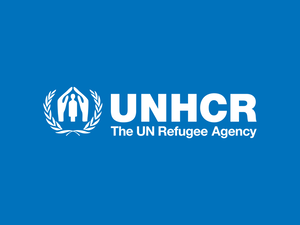Two years of war in Sudan: a devastating combination of record displacement and dwindling aid
Two years of war in Sudan: a devastating combination of record displacement and dwindling aid

Newly arrived refugees from Sudan set up their shelter at the overcrowded Renk Transit Centre in South Sudan, March 2025. © UNHCR/Reason Moses Runyanga
GENEVA – Two years since the start of the war in Sudan, the news remains exceedingly grim.
The world's most damaging displacement crisis is now happening amid the worst humanitarian funding situation in decades.
The brutal conflict, which shows little sign of abating, has caused a colossal trail of suffering, with families torn apart, clouding the future of millions and endangering regional stability. As displacement soars, needs are more urgent today than ever.
Nearly 13 million people have fled their homes to date, with almost 4 million crossing into the neighbouring countries of Egypt, South Sudan, Chad, Libya, Ethiopia, the Central African Republic, and further afield into Uganda. Displacement continued to grow in the second year of the conflict, with over 1 million people fleeing Sudan. New arrivals report experiencing systemic sexual violence and other human rights violations, as well as witnessing mass killings. Half are children, including thousands without any family. Sudan is now the country with the largest number of its people displaced as refugees in Africa.
The recent end to fighting in Khartoum has offered an opportunity to reach refugees and displaced people who had been largely cut off from aid for two years. Thousands have started to return to Khartoum, as well as other major urban centres in Omdurman, Wad Madani and Jazeera State, but these numbers are relatively slim compared to the millions still displaced. UNHCR, the UN Refugee Agency, and partners are scaling up support to assist those families making the choice to return home. The war has devastated the city’s infrastructure and essential services.
As the conflict and displacement have intensified, funding has lagged. Funding for the regional response is less than 10 per cent of what is needed, making it impossible to cover basic needs.
The latest global cuts in humanitarian funding put critical programmes at risk, with teams forced to make unreasonable choices and refugees being left to resort to harmful strategies to meet their basic needs. The reductions come when the needs have never been greater.
Inside Sudan, reduced funding will cut access to clean water for at least half a million displaced people, significantly increasing the risk of cholera and other waterborne diseases. It is also hindering the ability to move new arrivals to safer areas away from overcrowded transit centres at the border in places like South Sudan and Chad, where over 280,000 refugees remain stranded in makeshift sites without adequate shelter, clean water, health care, or protection.
In Uganda, the increase of new arrivals from Sudan, along with those from the Democratic Republic of the Congo, has put immense pressure on education. Reduced funding means refugee and host community students face extreme overcrowding in schools. The negative impact on the quality of teaching is discouraging enrolment. For many young girls, that will increase the risk of early marriage. For boys, it means pressure to work or attempt unsafe onward movements.
Across all refugee host countries, safe spaces are being closed and social workers discontinued, leaving tens of thousands of women and girls without counselling, health care, and vital support.
The lack of peace, sufficient aid and opportunities in asylum countries are driving more people to seek safety far beyond Sudan’s borders. Over 70,000 Sudanese refugees have arrived in Uganda. Others continue to attempt dangerous crossings to Europe. While the number of Sudanese arriving in Europe remains low, arrivals increased by 38 per cent year-on-year in the first two months of 2025. We fear more will have little choice but to join them.
Despite the constraints, neighbouring countries are keeping their borders open, with communities sharing the limited resources they have. UNHCR and partners are keeping interventions ongoing, doing their best to provide protection and assistance and accompany refugees through the current uncertainty. Alongside aid, more development funding is needed to prevent host communities from buckling under the overwhelming number of new arrivals, and so those going home can rebuild.
But with conflict lines shifting, people constantly on the move and resources running dry, hope is ebbing. A political solution for peace in Sudan is needed now more than ever.









